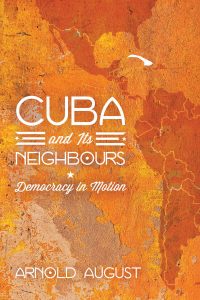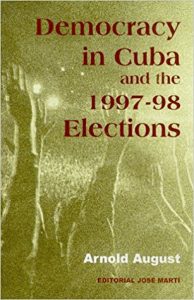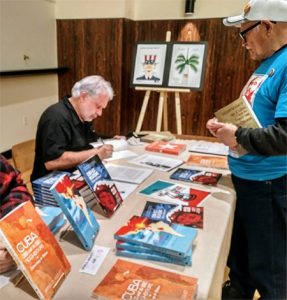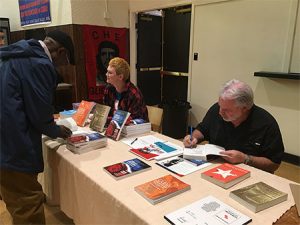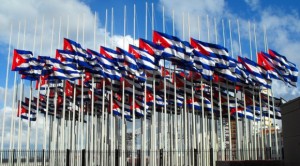How will the next President of Cuba Be Elected on April 19?
Sources from an expert on Cuba elections, Arnold August
For a full analysis based on interviews with Cuban deputies and experts as well as the author’s on the spot original field work of the full electoral process thus going beyond the formalities and dealing with Cuban reality, consult the book CUBA AND ITS NEIGHBOURS: DEMOCRACY IN MOTION by Arnold August. The publication also compares the political systems of the U.S. and Cuba, a theme being debated internationally in the wake of the recent March 11, 2018 Cuban elections and the upcoming election for a new President.
For further information and purchase:
https://www.democracycuba.com/index.html
Praise for the publication:
“Arnold August has been the most assiduous analyst of the Cuban electoral process for a decade and a half.” [written in 2014]
— Dr. George Lambie, professor of International Political Economy (Globalisation), Literature and Politics, Latin American Politics, De Montfort University, Leicester, U.K., and on the Editorial Board of the International Journal of Cuban Studies. From the International Journal of Cuban Studies, Journal of the International Institute for the Study of Cuba, Volume 6, Number 1, Spring 2014, Pluto Journals, ISSN 1756-3461.
“Finally, a book that explains in depth Cuba’s dynamic imperfect democracy and socialist system, while helping us understand its accomplishments on behalf of working people at home and abroad. August’s comparative critical analysis of popular movements for democratic change in Cuba, Venezuela, Ecuador, Bolivia, and the United States will help activists to learn from the mistakes and successes of the South while trying to democratize both the South and the North.”
— Dr. James Cockcroft, award-winning author of 48 books, three-time Fulbright Scholar.
“This book, a tour de force from an expert who clearly knows his field well, is one that goes out of its way to make us think about what we understand by “democracy” and how we should view new manifestations in the ‘Third World.’”
— Antoni Kapcia, Professor in Latin American History, Cuba Specialist, University of Nottingham, U.K. Campus.
“Arnold August cuts through the common propaganda about democracy in the U.S. and the supposed lack of democracy in Cuba. Where August’s earlier work on the Cuban political system opened a window to this forbidden island, Cuba and Its Neighbours deepens our understanding of Cuba’s participatory processes and shows how they have been shaped by Cuba’s revolutionary history.”
— Cliff DuRand, Professor Emeritus of Social Philosophy, Morgan State University, Baltimore, Maryland
“August’s latest book studies Cuba’s structures of governance including elections and the functioning of the state between elections. It greatly expands on his previous, extremely useful analysis of Cuba’s elections in the second half of the 1990s. This new book provides a much -needed tool for accurate assessment of Cuba’s unique system of political participation and representation, through empirical evidence rather than through the customary second-hand interpretation. A must-read for anybody seriously interested in Cuba, and in the overall question of democracy and its practices.”
— Claudia Kaiser-Lenoir, Professor Emerita of Latin American Studies, Tufts University, Medford, Massachusetts
“This book offers a trailblazing perspective: democracy in Cuba is evaluated and described from within the system itself while comparing it with other experiences. The concept of ‘democracy in motion’ analyzes a creative process, demonstrating how Cuba is a social laboratory. In Cuba, as well as in some Latin American countries, participatory democracy is taking shape. Arnold August contrasts these experiences to the pretences of the U.S. model. Compulsory reading to understand Cuba and break out of the supposed supremacy of ‘the single outlook.”
— Claude Morin, Honorary Professor, Latin Americanist, Université de Montréal, Québec
“Arnold August is an expert on the Cuban reality and a meticulous researcher like few others. With rigour and a critical approach, he successfully addresses in his book the challenge to explain the idiosyncrasies and the fundamental universal relevance emerging from a multi-faceted examination of the exercise of governance in Cuba. It is an indispensable work not only for us in Cuba who need to perfect the concepts and practices that would consolidate the system we have been building in very difficult conditions for more than fifty years, but also for others interested in the improvement of the human condition as it is experienced in other contexts.”
— Jesús Pastor García Brigos, Researcher, Political Philosophy, Instituto de Filosofía; supervisor of its Ph.D. Program; author of several books on People’s Power in Cuba; and a co-author of Cuba: Propriedad Social y Construcción Socialista (Editorial Ciencias Sociales, La Habana, 2012)
“It is an enriching book for all those interested because of the overview offered and the context in which it places Cuba. For the Cuban reader, the book is very significant because of its updated vision of what C. Wright Mills wrote more than half a century ago and about which Cuba is very familiar: “changes in the power system of the United States have not involved important challenges to its basic legitimations [sic legitimacy],” and thus the U.S. “appears now before the world a naked and arbitrary power, as, in the name of realism, its men of decision enforce their often crackpot definitions upon world reality.” For the neighbouring reader [in the U.S.], the profound analysis by August, a serious researcher on Cuban themes over a long period of time, brings us closer to the contemporary changes that are taking place in Cuba as an expression of the existing potentialities, but not without its contradictions and the necessity for new developments.”
— Rafael Alhama Belamaric, Cuban social science researcher and author of many books, including “Capital Humano: Autorrealización y Reconocimiento Social” (Editorial Ciencias Sociales, La Habana, 2008) and recipient of the Annual Prize for Critical Scientific/Technical Work (2009).
“Arnold August’s Cuba and Its Neighbours: Democracy in Motion is an exceptional work that will succeed in the objective of educating its audience. It will assist toward broadening the outlook of all those who read it.
The chapter on democracy in the United States is among the best critical analyses I have read of the American nation’s formation, ideology and political system. The documents linked to the book in the website democracyintheus.com have struck me as being very interesting and educational. The commentaries are brief but they go to the very essence of each of the themes, clarifying the reasons for which the political elite in this country operate the way that they do. Everything related to the Puritans and their thought, as well as other idiosyncrasies of the ideology that gave birth to the genesis of this nation, is of great interest, seeing that throughout history they are reflected in domestic and international policy.
The analysis of the Declaration of Independence and the Constitution, their limitations and their class origins is very revealing. The case study of the current president [Barack Obama] is part of the evaluation that I am making. The section on the U.S. presidential elections in 2008 and 2012, the significance of the existent president and how the electoral system functions in this country seem to me among the best that I have read on this theme.
The analysis of both the potential and the limitations of the Occupy Movement was very interesting for me. In fact, I learned only a couple of weeks ago [March 2013] while watching the TV channel Russia Today (RT) about the report that was divulged as a result of the Freedom of Information Act in which the FBI admitted having monitored this movement, among even worse acts than this. The U.S. press did not in any way reflect these events, at least not The New York Times that I read.
However, it was not solely this section of the book that impressed me. With regards to the absence of elections and democracy in Cuba, the publication contributes to undoing once and for all the myths imbued into the minds of consumers of information that is manipulated by the mass media, which is controlled by major economic interests, following the policy established by the political elites in this country.
The book’s description and analysis of the Cuban democratic and electoral system is excellent. It is undoubtedly the best that I have seen written on this theme. There are elements of the democratic functioning of Cuban society that even I myself had not noticed. The publication provides the key to recognizing unity and development of consensus as guides to the entire democratic process. The critical observations are perceptive, very intelligent and placed in their contexts.
I have begun to recommend the book to all those who are interested in the subject of Cuba. I sincerely believe that it has made a significant contribution to the elucidation of the democratic reality in Cuba. The book is being converted into a very valuable and essential instrument in the struggle in the field of ideas.”
— Fernando Gonzalez Llort, was one of the Cuban 5 imprisoned in the U.S., graduated with a summa cum laude in International Political Relations from the Higher Institute of International Relations University in 1987. He returned to Cuba in February 2014. He is a Hero of the Republic of Cuba.
“In Cuba and Its Neighbours: Democracy in Motion, Arnold August analyzes in a detailed manner the often disregarded Cuban electoral system, tearing to shreds the many clichés about the Caribbean republic. He also carries out a sound comparison with the United States, Venezuela, Bolivia and Ecuador, bringing us to question the concept of democracy and its various definitions that are often based on preconceived notions. This work, soundly documented and characterized by considerable scientific cogency, is a reference point for all persons interested in the subject of democracy as manifested in its various forms.”
— Dr. Salim Lamrani is a graduate in Iberian and Latin American Studies at Paris-Sorbonne University-Paris IV. He is now a lecturer at this university as well as at Paris-Est, Marne-la-Vallée University, and has authored many books and articles
“Arnold August offers us his deep analysis of Cuban reality in its own historical context. It is a balanced approach toward Cuban democracy, a system that is not perfect, but is fully Cuban. From his own viewpoint as an expert analyst, August reveals before his readers’ eyes a reality that is silenced or distorted by the mainstream media. For the Cuban audience, the book is proof of acknowledgement by non-Cubans who know, admire and defend the essence of the Cuban social process. This is a must-read if one really wants to understand Cuba and the struggle of the Cuban people.”
— Luis Chirino, Cuban journalist, university professor at Instituto Internacional de Periodismo José Martí and member of the professional association of Cuban journalists, Unión de Periodistas de Cuba (UPEC)
“Arnold August, in his book Cuba and Its Neighbours: Democracy in Motion, allows readers to become familiar not only with the reality of the island’s close neighbour, the United States – the process of its formation, its laws, its ability to endure as well as the characteristics and essential elements of the power apparatus – but also with Cuba and surrounding Latin America. He addresses in particular those countries that are developing 21st-century socialism, with its blue-green-reddish colours, that is to say, preserving elements of the old society, enhancing democratic values and providing an opening for its political, cultural or citizen revolutions in order to build a new society. The references to the links between these countries and their different realities constitute another interesting approach, focusing the analyses on political designs and the legal norms placed in their historical context, thus demonstrating that these countries are not seeking to attain the impossible.
The examination of Cuba does not amount to praise on a groundless basis; rather, the author, while recognizing the achievements, is critical, and he identifies the limitations and offers his judgments concerning causes and conditions. He exposes real phenomena and, with this global approach, he allows the reader to know what is being done and why the people are struggling, including the adversities of these nations, whose realities are being distorted as they face the monopoly of mass media and those who seek to impose control based on a single model. Perfect models do not exist – all can be perfected – and Cuba is shown as following that path.”
— Martha Prieto Valdés, Ph.D. in Legal Science, Tenured Professor of General Theory of Law and Constitutional Law at the Faculty of Law (University of Havana), Tenured Member of the Cuban Academy of Sciences, Social Science Section
“Arnold August’s book Cuba and Its Neighbours: Democracy in Motion is without doubt a publishing achievement that merits the largest dissemination and analysis, given its serious contribution to the scope of Cuban studies carried out in other countries. In contrast to other publications that confine themselves to a highly opinionated approach, August reveals the results of a profound investigation based on different scientific methods, which include, among others, interviews with a wide spectrum of Cubans who brought forward different points of view; fieldwork in scenarios where people’s participation develops; and, finally, the analysis of documents that provide the legal imprint and juridical order to Cuban socio-political life.
Based on a clear and precise language, August analyzes Cuban reality by plunging into the Caribbean island’s political system and its innovative mechanisms of democratic practice, which, in the main, are not known outside of Cuba. This ignorance has facilitated the proliferation of distortions whose objective is to delegitimize the Cuban Revolution. The book contributes to undoing these misrepresentations by divulging the diversified facets of the development of democracy in Cuba and one of its most important qualities: the continual striving for empowerment by sectors of the people at the base.
We are sure that this book will be very well welcomed by those readers interested in serious and profound analyses of contemporary alternative processes that seek a more just and equitable social order.”
— Dr. Olga Fernández Ríos, Researcher, Instituto de Filosofía, Havana, Associate Professor of Philosophical Sciences, University of Havana
ARNOLD AUGUST’S FIRST BOOK ON CUBA (1999) IS CONSIDERED BY MANY AS A GROUND-BREAKING PUBLICATION FOR ITS VIVID DESCRIPTION OF THE ELECTORAL PROCESS ACCOMPANIED BY PHOTOS TAKEN BY THE AUTHOR. THIS PUBLICATION INCLUDES HIS ATTENDANCE OF THE 1998 CONSTITUTION IN HAVANA OF THE NEW PARLIAMENT AND THE ELECTION OF THE COUNCIL OF STATE AND ITS PRESIDENT. THE PROCEDURE IS THE SAME FOR APRIL 19, 2018
CONSULT:
DEMOCRACY IN CUBA AND THE 1997-98 ELECTIONS
BY ARNOLD AUGUST
TO PURCHASE USED COPIES, SEE HERE:
https://www.amazon.com/gp/offer-listing/0968508405/ref=dp_olp_used?ie=UTF8&condition=used
OR

